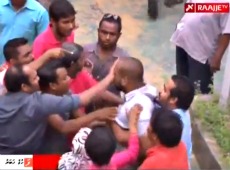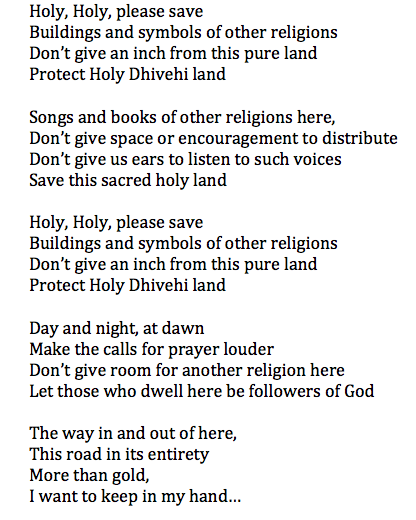Former President Mohamed Nasheed has claimed the Maldivian Democratic Party (MDP) will receive at least 125,000 votes in the September 2013 election, an estimate based on the number of pledges received during its recent nationwide door-to-door campaign.
Nasheed’s contesting of the September elections appears increasingly likely after a criminal court case potentially disqualifying him from running became mired in allegations of politicisation – most notably from members of JSC, the same body responsible for both establishing the court hearing the case and appointing the panel of judges.
The Elections Commission (EC) will formally announce the various presidential candidates in mid-July.
Currently, contestants are likely to include Nasheed, as well as his former Vice President and incumbent Dr Mohamed Waheed in a possible coalition arrangement with other smaller parties. Also expected to contest are Progressive Party of the Maldives (PPM) candidate Abdulla Yameen – the half-brother of the Maldives’ former autocratic leader Maumoon Abdul Gayoom – Dhivehi Rayithunge Party (DRP) Leader Ahmed Thasmeen Ali, and Jumhoree Party (JP) Leader Gasim Ibrahim, a resort tycoon, MP, media oligarch and member of the JSC.
To win government, a candidate must secure 50 percent of the vote ‘plus one’ in the first round. If this does not happen, the EC will hold a second round ‘run-off’ election several weeks after the first.
The MDP – currently the largest party in terms of membership – has declared it intends to secure a first round win.
Despite all other parties currently in government being allied against the MDP – albeit in an increasingly fractious coalition – the opposition party has dismissed the possibility of a power sharing agreement should the outcome rest on the anticipated chaotic last-minute deal-making of a second round.
“Listen to the radio on the evening of September 7, you will hear that the Maldivian Democratic Party had received 125,000 votes. Listen to the radio, listen to the radio and watch the TV,” declared the former president at a recent rally on Milandhoo in Shaviyani Atoll.
Asked to elaborate how the figure was reached, MP and former party chairperson Mariya Ahmed Didi said the party tallied the number of people who pledged to vote for Nasheed during the the MDP’s campaigning.
“We counted the amount of pledged votes so far and came to that figure. There are still some smaller islands where we have still not completed the door-to-door,” she told Minivan News.
According to the Elections Commission, 240,302 people will be eligible to vote in the presidential elections – a 15 percent increase (31,000 people) on 2008’s 209,294 eligible voters.
Bitter political and societal polarisation over February 2012’s controversial transfer of power is likely to swing fence sitters and make the results unpredictable, but the ‘high stakes’ are liable to ensure a relatively high voter turnout – as observed during the country’s first democratic multi-party election in 2008, which saw 85 percent for both rounds.
Assuming a similar voter turnout is witnessed during September’s elections as was seen in 2008, the MDP’s estimate of securing 125,000 votes is a prediction that amounts to 61 percent of the total electorate.
Outside of political division over the transfer of power on February 7, 2012, whether the MDP is able match its ambition to win the first round will hinge on the party’s appeal to young voters – particularly 31,000 18 year-olds – and whether it can match or exceed its performance in urban areas in the 2011 local council elections.
In February 2011, the then opposition DRP secured a clear seat majority across the islands and atolls in an election with a voter turnout of 70 percent and widely considered credible.
However, MDP secured an overwhelming majority of council seats in almost every major population centre, notably Male’, Addu City in the south and Kulhudhuffushi in the north – collectively accounting for approximately 50 percent of the total population.
The DRP was later split into two factions, leading former President Gayoom to eventually break away and form the PPM, which is now the second largest party in the Maldives after the MDP in terms of number of MPs.
The remnants of the DRP, together with other parties including Gasim’s JP, potentially the Maldives Development Alliance (MDA) of resort owner MP Ahmed Shiyam, and Waheed’s coalition – presently including the Dhivehi Qaumee Party (DQP) and the religious conservative Adhaalath Party (AP) – are likely to face an uphill battle in the first round.
As such, the best chance for smaller parties to leverage power may be in drawing away enough MDP votes to survive the first round and trigger power-sharing negotiations ahead of the second round.
Election challenges
Transparency Maldives has highlighted vote-buying, political polarisation, and election credibility as critical challenges for the 2013 elections, in its comprehensive pre-election assessment report released in March this year.
The NGO noted that political polarisation in the Maldives had grown in the wake of the failed all-party talks and events of February 7, 2012, leading to bitter mistrust between political factions and the pervading sense among parties that the loss of the upcoming elections “could amount to losing everything”.
“Political polarisation is characterised by mutual mistrust and radical negative categorisation of people, politicians, political parties and, sometimes, entire institutions,” Transparency noted.
“It’s characterised by the lack of self-reflective criticism, by the failures to hold one’s own self and party to account, and the inability to listen to and compromise for the callings of the other side. It’s also characterised by an apparent struggle for political power as a bitter zero-sum game.”
As a result of this polarisation, the limited space for public debate on urgently-required public policies and programs continue to be “colonised by demagogic appeals to religio-nationalist sentiments, empty motifs, and outlandish electoral promises never intended to be delivered,” Transparency stated.
“Similarly, as the polarisation is symbolised by political personalities, political debate is likely to center on personalities as opposed to issue-based discourse.”
Particular challenges around polarisation include a “lack of cooperation and dialogue among major political parties, opening up space for intolerance and violence”, “a possibility of contestation of elections results, especially if the victory is through a narrow margin”, and the risk that even if the election results are respected, “a significant segment of the polity might reject the incoming president as the representative for all the people in the true democratic spirit required in defeat.”
Transparency called in the findings for restraint among parties, appealed for policy debates, and extensive and long term observation on behalf of the international community.

